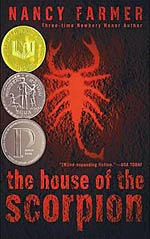
![]() digitaltempest
digitaltempest
6/4/2016
![]()
My children have turned out to be avid readers as I am, especially my oldest. My son reads in a wide variety of genres, but he seems to be settling into a routine of reading mostly SFF like me. This book was a recommendation from my son. I'd spied him reading this about a month back, and I was tempted then to steal his book for myself. After doing some reshuffling of my books for the Women of Genre Fiction Challenge on Worlds Without End, he suggested that I add this book to my list since it was written by a woman. Since my interest was already piqued, it didn't much convincing for me to do just that.
Matteo "Matt" Alacrán is the clone of a drug lord who owns a small country called Opium located between the United States and Aztlán (formerly Mexico). In this near future setting, the United States is no longer the premier country of the world, and in fact, the southern parts of the United States seem to be a hard and unattractive place to live as many Americans try to cross into Aztlán. People illegally crossing the borders from either side are dealt with harshly by El Patrón (the man Matt is cloned from) who forces most of them into a type of slavery using a computer chip that renders them unable and unwilling to do anything other than what they're told.
At the beginning of this story, six-year-old Matt is living isolated in a small house in the opium fields with a worker named Celia. He longs desperately to talk to someone, to be around more than just Celia, even though he loves her very much. He has no idea about the world beyond the poppy fields until he meets the Mendoza sisters and the great-great-grandson of El Patrón. Once he's spied by the children, the secret of his existence can no longer be ignored. The family knows of his existence, but largely forgot about him because he was out of sight. Finally, Matt meets the man whose DNA he shares. El Patrón is 140-years-old when Matt meets him, and Matt loves him from the moment they meet.
Existence for Matt is not an easy thing. He's despised by the Alacrán family, excluding the patriarch, and most people who interact with the family. Clones as seen as beasts, nothing more than chattel. Most clones' brains are chemically tampered with at birth to make them nothing more than drooling, living specimens, as required by law, but El Patrón stops Matt from undergoing that treatment as a baby. Matt is given respect because to do anything other than that would mean facing the wrath of El Patrón, but he has little meaningful contact with people in Opium aside from a few. Over the years that Matt grows up in the Alacrán family, he learns that that El Patrón might not be worth the admiration and love that Matt feels for him.
This book skews on the younger end of the Young Adult spectrum, and I was impressed with how complex this book is, especially since books that skew younger tend to deal with things in a more simplistic manner for easy understanding. This book explores the complexity of relationships and social standing. There's the issue of personhood and acceptance that runs strong in this book due to the various questions that come up because of Matt's status as a clone. I'm not saying that this book explores those issues as deeply as a book geared toward adults or older young adults would, but it certainly opens a path to dialogue about various moral and ethic issues while having themes that are more familiar such as bullying, standing up for what's right, and friendship. My son and I had a very lively discussion about this book after I finished. This book also has the added bonus of having a wide appeal. It isn't so futuristic that people who don't enjoy science fiction would feel alienated, but it's also not so sterile that fans of SFF can't enjoy it. There were some plot points that I felt dangled and some that didn't reach a satisfying conclusion, but overall, I enjoyed this story.
Raúl Esparza did such a wonderful job narrating this, and I appreciate that someone who actually speaks Spanish fluently was chosen for this book to make it sound authentic since there were many instances where things were spoken in Spanish (but often translated to English in a way that's not attention breaking). Too often narrators are chosen who do such a spectacular job at butchering accents and languages, and I end up cringing. Now, he did have to do a few English and Irish accents, and I can't really comment on how great those were or weren't. They sounded passable to me, but I'll leave that assessment to someone who has a better ear for those accents.
Part of my higher rating probably comes from the fact that I'm viewing this from a parental angle and seeing it as a valuable learning tool for children, but I think, even if this had been a book that I picked up on my own, I still would've rated this as an excellent read.
https://bibliosanctum.com/2016/06/04/ya-audiobook-weekend-the-house-of-the-scorpion-by-nancy-farmer/